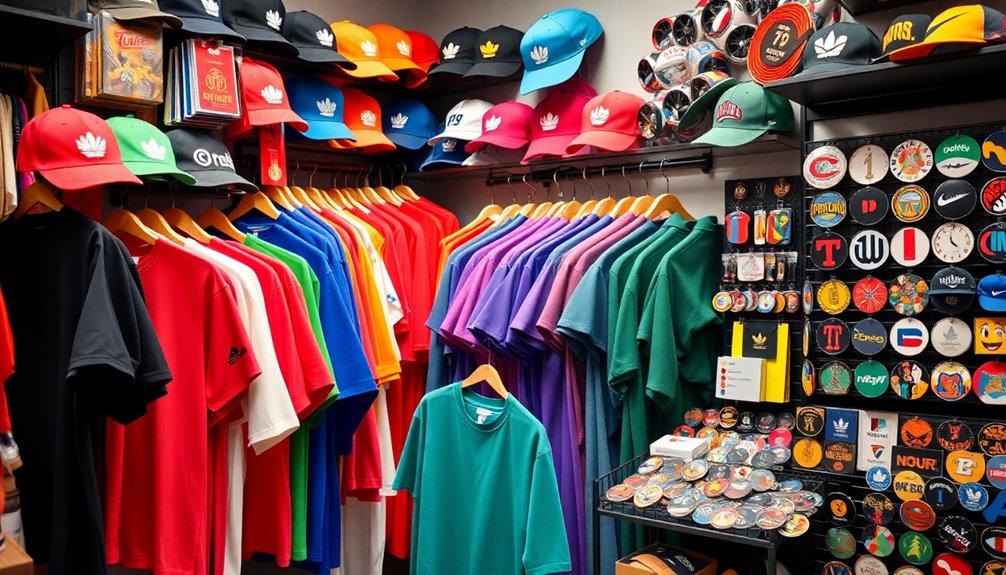Merch includes a variety of products, like t-shirts, collectibles, and accessories, specifically made for fans. It took off in the 1980s as a way for fans to show loyalty to their favorite artists. Today, merchandise isn't just about apparel; it's also about exclusivity, with limited editions driving demand and connection. You might spend over $50 not just on clothing but on vinyl records and unique items that reflect your identity. Online shopping has made it easy to access these exclusive items. If you're curious about how trends are evolving, there's much more to discover about the current merch landscape.
Key Takeaways
- "Merch" refers to merchandise designed for fans, including apparel, accessories, and collectibles, reflecting informal fan culture since the 1980s.
- Merchandise sales account for over 30% of artists' income during tours, significantly impacting their financial success.
- Limited edition and exclusive items create urgency, enhancing fan engagement and fostering a stronger bond between fans and artists.
- Online shopping experiences have improved with features like detailed product descriptions and notifications, boosting customer satisfaction and sales.
- Future trends include personalized merchandise, sustainable practices, and the use of AR/VR technologies to enhance shopping experiences.
Definition of Merch
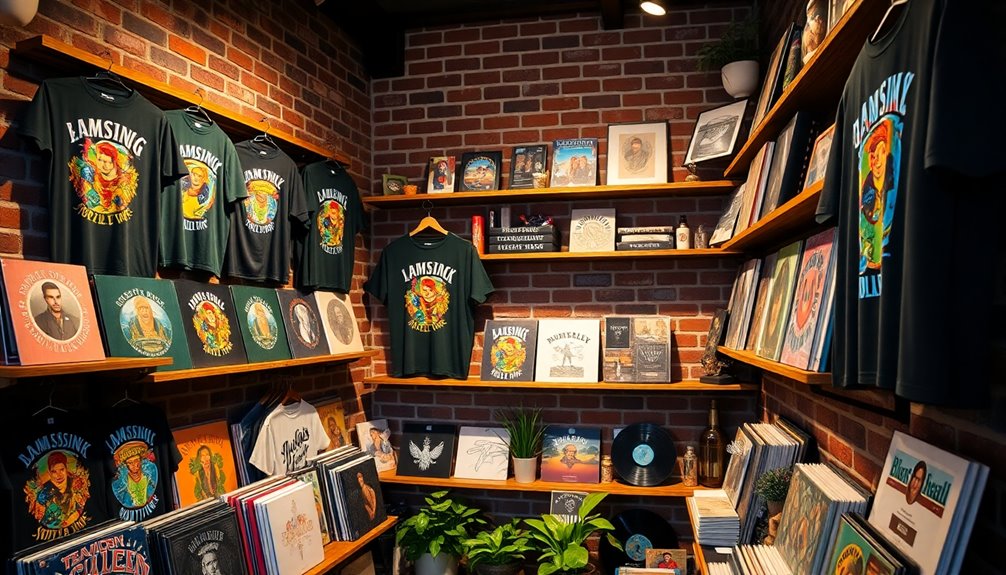
When you hear the term "merch," it usually refers to merchandise tailored for specific fan bases, like t-shirts, collectibles, and various accessories. This informal term, a shortening of "merchandise," first popped up between 1980 and 1985, marking a shift in how we talk about products aimed at fans.
Merch is often sold during tours or events, enhancing your connection to artists and brands. The rise of fan culture has greatly boosted the popularity of merch across entertainment industries, particularly in music, sports, and gaming. Additionally, the presence of young tennis prodigies has inspired unique merchandise that appeals to new fan segments.
It's more than just products; it's about building loyalty and a sense of belonging among fans. You'll find that many artists rely on merchandise sales to generate substantial revenue, especially as trends for limited edition and exclusive items take off.
Social media plays an essential role here, helping to market these items and create buzz around new releases. Moreover, the effectiveness of ad campaigns is monitored through cookies, providing insights into consumer behavior that can influence merch offerings.
In essence, merch is an important part of today's entertainment landscape, reflecting your passions and helping you feel a deeper connection to the things you love.
History and Origins
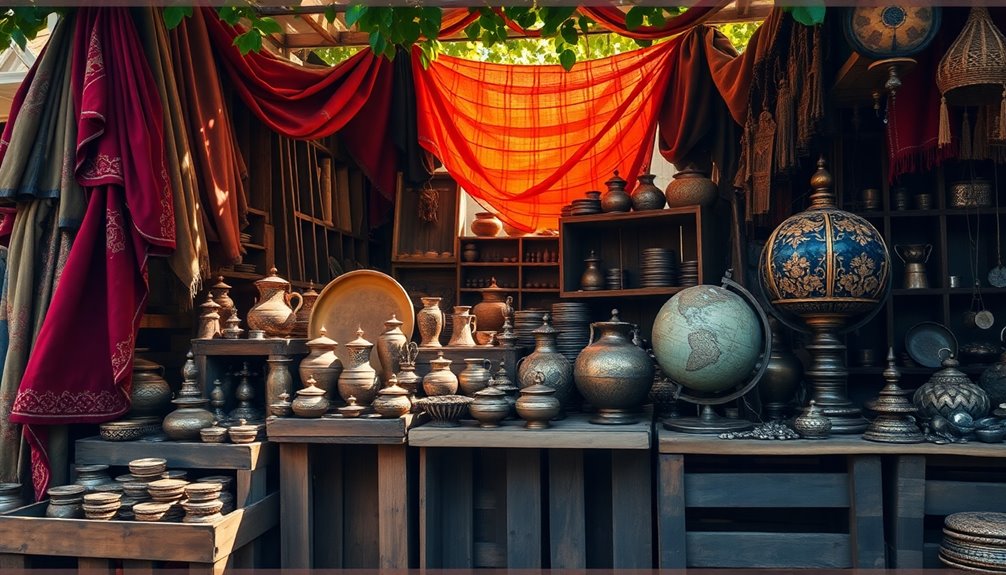
You might be surprised to learn that the term "merch" emerged in the 1980s, reflecting a shift in how we talk about merchandise.
As fan culture grew, so did the role of merch in connecting fans to their favorite artists and shows.
This evolution not only highlights the cultural impact of merch but also how it engages fans in unique ways.
Evolution of Merch Terminology
Emerging in the early 1980s, the term "merch" quickly became a staple in the vernacular of fan culture, particularly within the music industry. You might find it interesting how this casual abbreviation of "merchandise" reflected a shift towards informal language. As fan culture grew, so did the demand for items tied to beloved artists, leading to a boom in merchandise sales.
Here's a snapshot of how "merch" transformed over the years:
| Era | Characteristics |
|---|---|
| 1980-1985 | Emergence of the term, basic items |
| 1990s | Expansion into collectibles, apparel |
| 2000s-Present | Limited editions, exclusive drops |
As you explore deeper, you'll notice that "merch" now encompasses a wide variety of products, from clothing to accessories, often available at concerts and events. This evolution showcases how merchandising has become a major revenue stream for artists, highlighting a direct connection between creators and their audiences. The informal nature of "merch" captures the changing landscape of marketing in entertainment, making it an integral part of fan engagement today.
Cultural Influence on Merch
The cultural influence on merch has deep roots in the evolution of fan engagement, shaping how artists connect with their audiences. Since the term "merch" emerged in the 1980s, it reflected the growing trend of informal language in fan culture. As concerts and conventions gained popularity, artists began selling items tailored specifically for their followers, enhancing that connection.
Merch has transcended the music industry, impacting various entertainment sectors. Here are some key aspects of its cultural significance:
- Brand Enhancement: Influencers and celebrities use merch to strengthen their personal brands.
- Collector's Appeal: Limited edition and exclusive items create urgency, driving demand among fans.
- Social Media Impact: Platforms allow for direct artist-fan engagement, amplifying merch marketing.
- Cultural Expression: Merch serves as a canvas for fans to express their identity and loyalty.
Today, the cultural significance of merch continues to evolve, solidifying its role not just as products but as essential tools for connection in various entertainment industries.
Merch in Fan Engagement
Throughout the history of fan engagement, merch has played an essential role in fostering connections between artists and their audiences. The term "merch," derived from "merchandise," rose to prominence between 1980 and 1985 alongside the growth of fan culture across entertainment industries.
It's interesting how merchandise is often tailored to specific fan bases, enhancing loyalty with items like t-shirts, collectibles, and accessories linked to artists and events. Selling merch at concerts has become a significant revenue stream for artists, allowing them to establish a direct connection with fans and promote their brand identity.
You might notice that limited edition and exclusive items are particularly sought after, creating urgency among fans enthusiastic to snag unique pieces related to their favorite artists.
Social media has also transformed how merch is marketed. Platforms enable artists to reach broader audiences and engage directly with fans about new product launches and exclusive offers. This interaction not only drives sales but also deepens fan loyalty, making merch a cornerstone of fan engagement today.
Fundamentally, merch isn't just about products; it's about building a community centered around shared passion and support for artists.
Types of Merch
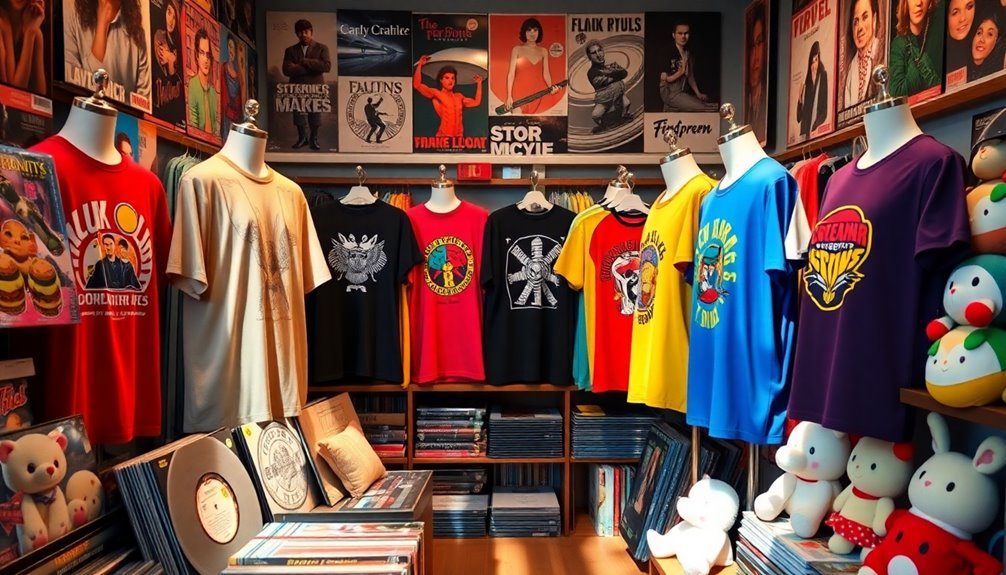
When it comes to types of merch, you'll find a diverse array that caters to fans and collectors alike. Merch typically falls into several key categories, each offering something unique.
Here are four popular types of merch you might encounter:
- Apparel: This includes t-shirts, hoodies, long sleeves, and jackets, usually priced between $25.00 and $60.00. They're a great way to show off your fandom.
- Accessories: Items like wristbands, keychains, and decorative collectibles fall into this category. Prices range from $5.00 to $65.00, making them accessible for fans looking to add to their collection.
- Vinyl Records: These are often priced around $30.00, with limited edition releases that are highly sought after. If you're a music lover, this is a must-have.
- CDs: Usually more affordable at around $15.00, these can sell out quickly, especially for popular titles. They make excellent additions to any fan's library.
Each type of merch not only enhances your connection to the artist but also supports them financially.
Popular Merchandise Categories
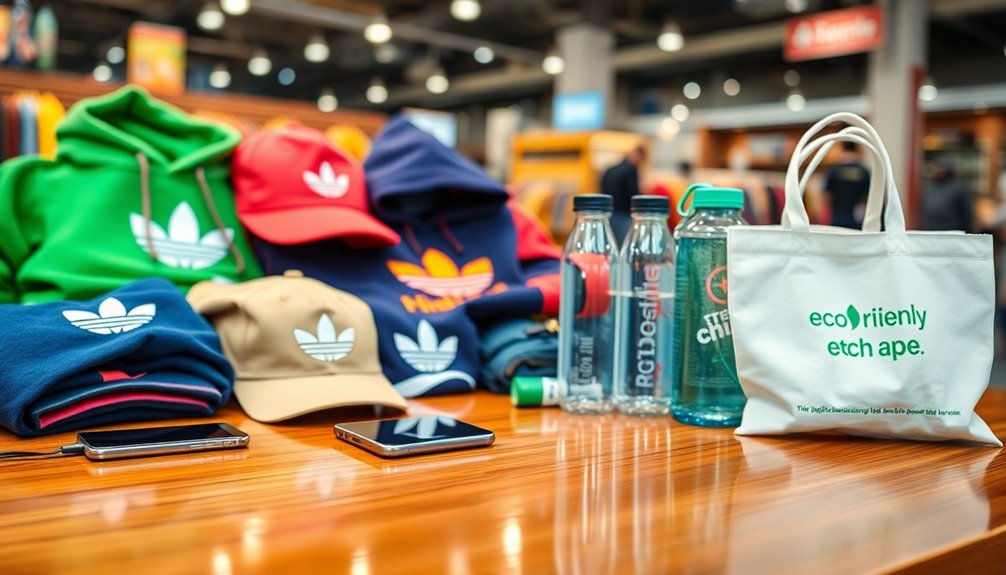
Diving into popular merchandise categories reveals a treasure trove of options that cater to a wide range of tastes and preferences.
If you're a music lover, vinyl records are a hot commodity, prized for their collectible value and superior sound quality, usually priced around $30. For those who enjoy wearing their fandom, apparel choices abound. T-shirts typically start at $25, while cozy hoodies often retail for about $45.
Don't overlook accessories, either. Items like keychains and belt buckles can range from $5 to $65, depending on the brand and item. If you're a fan of physical music formats, CDs remain a budget-friendly option at around $15, though some titles might be sold out, indicating a strong demand.
Limited edition releases and specialty items can really elevate your collection, especially if you're a dedicated fan. These unique pieces often spark excitement and drive consumer interest, making them must-haves for collectors.
Whether you're adding to your music library or showcasing your style, there's something for everyone in these popular merchandise categories.
Economic Impact of Merch
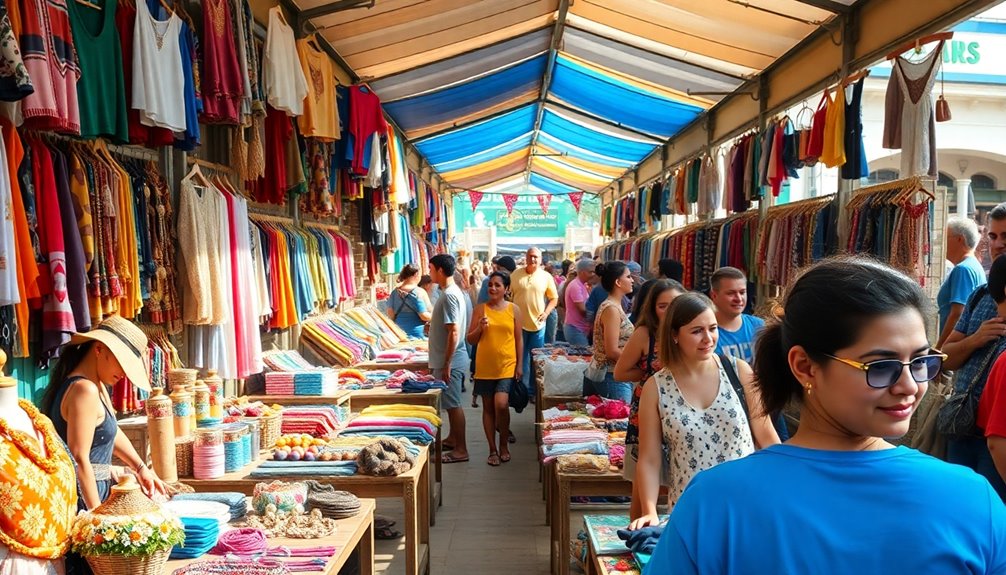
Merch isn't just a side hustle; it's a major revenue stream for artists that can account for over 30% of their income during tours.
When you buy exclusive items, you're not only showing loyalty but also driving demand, which impacts market trends considerably.
This economic dynamic extends beyond artists, benefiting venues and businesses through increased sales and foot traffic during events.
Revenue Generation for Artists
Many artists find that merchandise sales play an essential role in boosting their revenue, often making up a significant share of their income, especially for independent musicians.
Selling merch isn't just about extra cash; it's a crucial income stream that many rely on to sustain their careers. Additionally, leveraging data-driven marketing strategies can enhance the visibility and appeal of merchandise offerings. Moreover, incorporating educational toys into your merchandise can attract a wider audience, as they serve both as collectibles and learning tools.
Here are four key reasons why merch contributes to revenue generation:
- High Demand: Limited edition and exclusive items can spark intense interest, driving up sales.
- Fan Connection: Merchandise fosters a deeper bond between you and your fans, making them feel more invested in your music.
- Broader Economic Impact: Your merch sales can benefit venues and local businesses, increasing foot traffic and consumer spending in your community.
- Diverse Income: With the entertainment sector's ever-changing landscape, merch sales offer a steady revenue source beyond streaming and performances.
Additionally, successful celebrity lifestyles often integrate effective merchandising strategies that resonate with their audience.
Fan Engagement and Loyalty
In the world of music, engaging with fans goes beyond just performing songs; it's about creating a lasting connection. Merchandise plays a vital role in this relationship, as it allows you to express your love for your favorite artists. When you purchase merch, you're not just buying a product; you're investing in an experience that strengthens your bond with the artist. This investment also reflects a broader trend in the market where fan engagement is crucial for sustaining an artist's career. Additionally, unique experiences such as themed cruises can enhance fan interactions, making them feel even more connected to the artist. The significance of celebrity reputation in this context can greatly influence merchandise sales.
Limited edition and exclusive items often create a buzz, driving demand and enhancing brand loyalty. You find yourself willing to spend more on unique pieces that represent your favorite musicians, which also reflects a broader trend in consumer behavior. This culture of merchandise fosters community among fans, making you feel like part of something bigger.
Moreover, merch sales have a significant economic impact beyond just the artists. They benefit venues and local businesses during events and tours, creating a ripple effect throughout the economy. By supporting artists through their merchandise, you're contributing to a thriving ecosystem that nurtures your favorite acts while building a sense of belonging. Additionally, the success of merchandise can lead to increased awareness of the importance of supporting creative endeavors, which ultimately benefits the entire artistic community.
Ultimately, this connection fosters long-term support and loyalty, ensuring that you remain part of the journey as your favorite artists grow and evolve.
Market Trends and Demand
The merchandise market plays a crucial role in shaping artists' financial landscapes, often accounting for as much as 30% of their total income. This impact stretches beyond the artists themselves, benefiting venues and associated businesses.
As a fan, you mightn't realize your spending contributes considerably to this ecosystem.
Here are some key market trends driving demand for merchandise:
- Limited Edition Items: Exclusive merchandise often sells out quickly, especially during concert tours, creating a sense of urgency among fans.
- Consumer Spending Habits: Many fans are willing to spend upwards of $50 on apparel and collectibles, reflecting their dedication to their favorite artists.
- Social Media Influence: Successful marketing campaigns on platforms like Instagram can lead to increased sales and stronger brand loyalty.
- Diverse Product Offerings: From clothing to collectibles, a wide range of products caters to different fan preferences, further boosting sales potential.
As you engage with your favorite artists, remember your purchases play a crucial role in their success, illustrating the economic impact of merchandise in the entertainment industry.
Shopping Experience
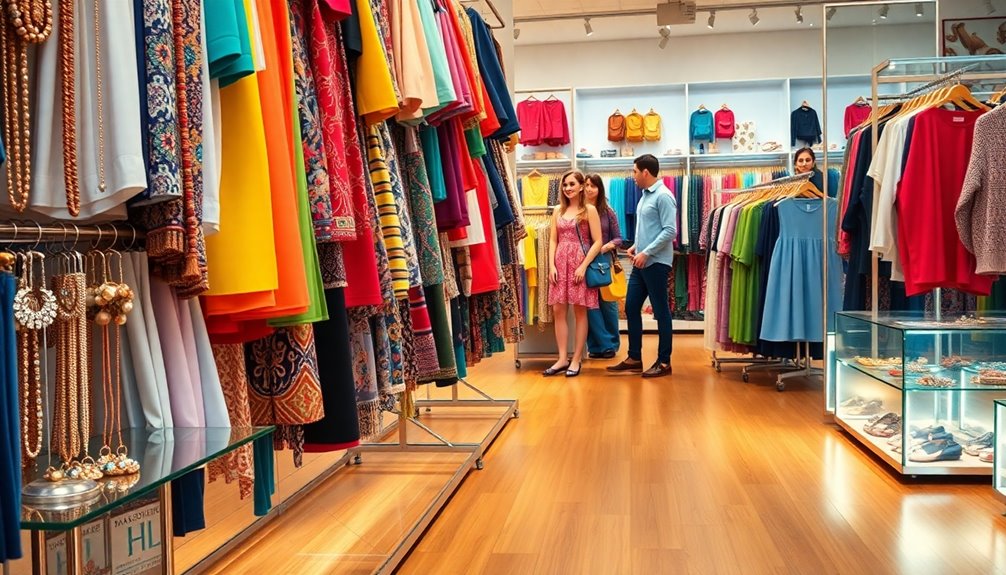
Frequently, shoppers appreciate a seamless online experience that makes purchasing easy and enjoyable. Your journey begins with quick view and add-to-cart options, streamlining the process and saving you time. Detailed product descriptions provide essential information, including fabric, care instructions, and size options, helping you make informed choices.
You'll receive timely notifications for out-of-stock items, keeping you in the loop about product availability. The user-friendly interface simplifies selecting sizes and product variants, ensuring a hassle-free shopping experience. Plus, regular updates on restocked items keep the inventory fresh and appealing.
Here's a quick glance at the features enhancing your shopping experience:
| Feature | Benefit | User Experience |
|---|---|---|
| Quick View | Save time, see details quickly | Effortless browsing |
| Detailed Descriptions | Informed purchasing decisions | Confidence in choices |
| Notifications | Stay updated on availability | Never miss out on favorites |
With these thoughtful features, your online shopping is not only efficient but also enjoyable, allowing you to focus on what matters most—finding the perfect merchandise.
Artist and Brand Collaborations
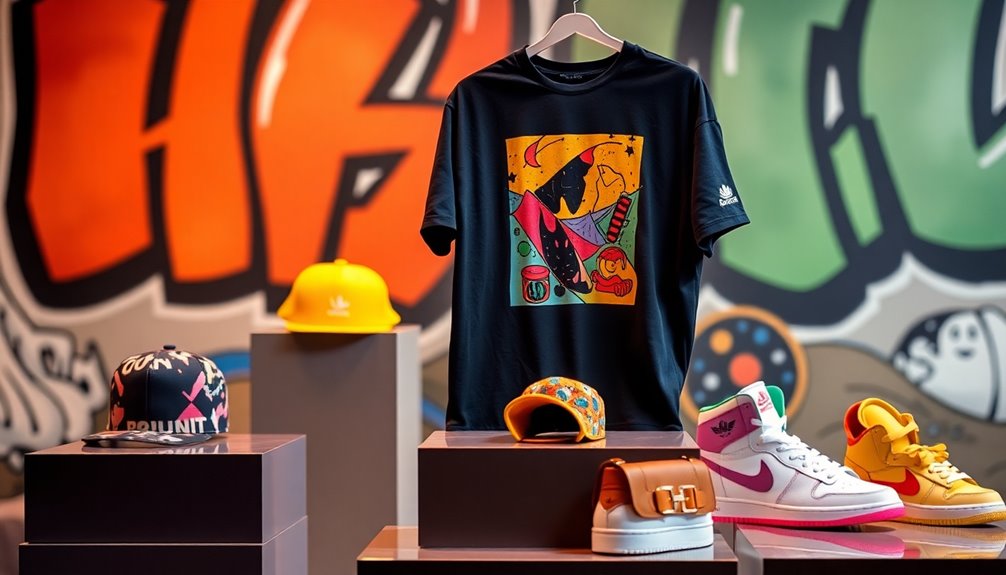
Collaboration sparks excitement in the world of merchandise, especially when artists join forces with brands. These partnerships create unique opportunities for fans to connect with their favorite artists while enjoying exclusive products.
You'll find that artist-brand collaborations often produce limited edition items, which enhances fan loyalty and engagement. Here are four key benefits of these collaborations:
- Exclusive Merchandise: Fans crave unique products that reflect both the artist's and the brand's identity, making these items highly desirable.
- Limited Editions: By offering limited quantities, brands create urgency, driving fans to purchase quickly before items sell out.
- Revenue Boost: Successful collaborations tap into the artist's fan base, increasing sales for both parties while introducing the brand to new audiences.
- Social Media Buzz: Influencers and artists leverage their platforms to promote these collaborations, generating excitement and driving engagement.
In essence, artist and brand collaborations not only enhance the merchandise landscape but also foster a deeper connection between fans and their favorite artists.
Online Merch Stores
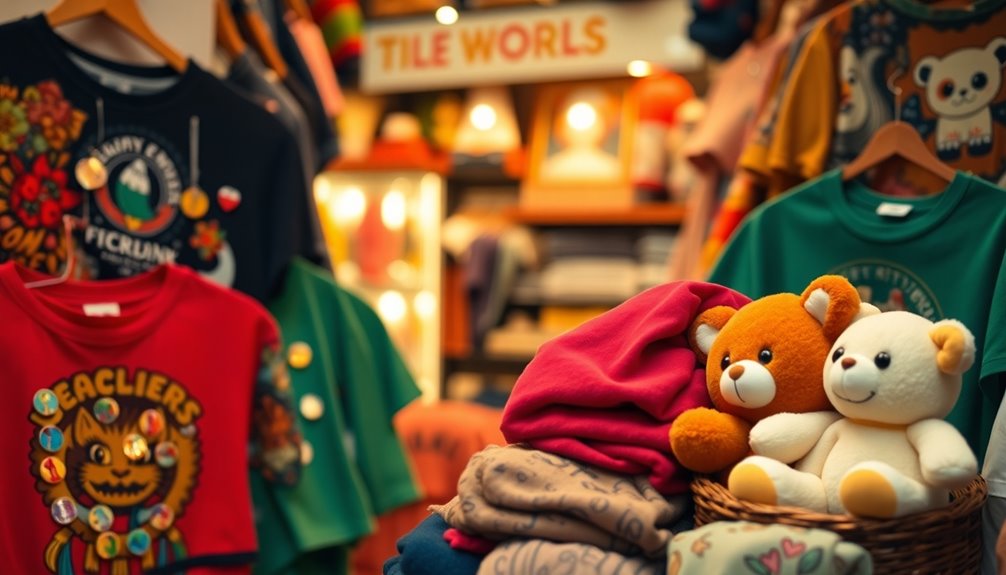
Online merch stores have revolutionized how fans connect with their favorite artists, offering a convenient platform to shop for a variety of products, from apparel to vinyl records.
These online platforms let you browse and purchase items directly from the artists, making it easier than ever to support them. You can find everything from t-shirts and hoodies to exclusive vinyl records and unique accessories.
Many online stores also provide subscription services that alert you to new merchandise and offer weekly discounts tailored to your preferences.
With user-friendly interfaces, you can quickly view items, add them to your cart, and manage subscriptions without hassle.
Additionally, detailed product descriptions, including fabric types and care instructions, help you make informed decisions before buying.
You won't just find regular items; many stores feature exclusive and limited-edition products that heighten your connection to the artist and drive demand.
Future Trends in Merch
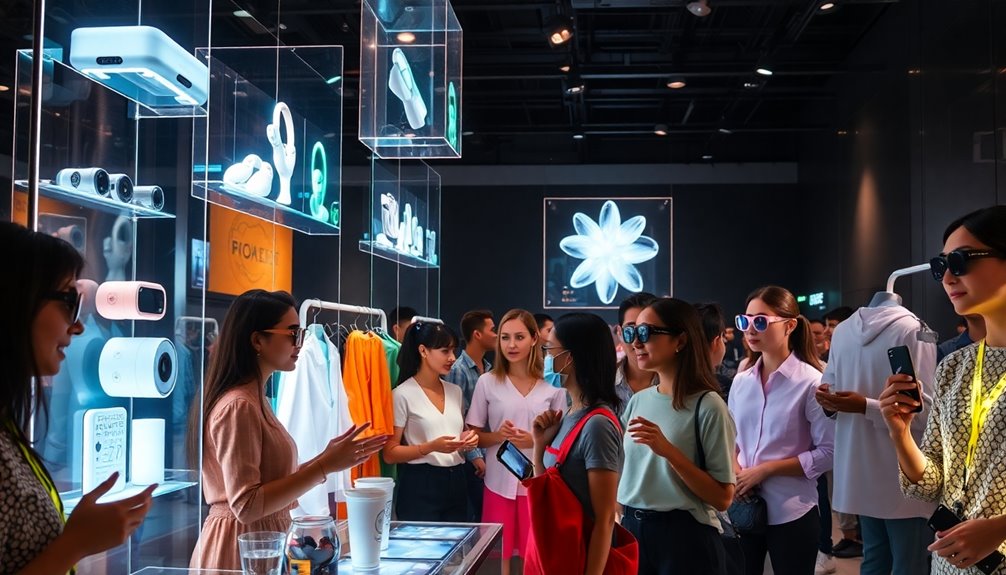
As fan engagement evolves, future trends in merch are set to reshape how you connect with your favorite artists.
You'll see a shift towards more personalized merchandise, driven by data analytics and your preferences, enhancing your loyalty and connection to the brand. As brands embrace renewable energy sources, they may also reflect sustainability in their merchandising practices, similar to the growing trend of eco-friendly materials in various industries. The use of natural materials in toy production is a notable example of how brands can prioritize safety and environmental responsibility.
Here are four key trends to watch:
- Sustainability: Brands are moving towards eco-friendly materials and practices, responding to your demand for responsible consumerism.
- Augmented and Virtual Reality: Expect AR and VR technologies to revolutionize your shopping experience, letting you visualize products in interactive environments before you buy.
- Subscription Models: Limited-edition and exclusive merch will likely become more popular through subscription services, keeping you engaged and excited about collectible items.
- Social Media Marketing: Influencers and targeted ads on social platforms will become essential for brands, ensuring you discover the merch that fits your niche interests more effectively.
Additionally, the rise of data analytics in personalizing merchandise strategies will empower brands to tailor offerings specifically to your tastes.
These trends signify a more immersive, personalized, and responsible approach to fan engagement, ultimately making your connection with artists even more meaningful.
Frequently Asked Questions
What Does Merch Mean?
Merch refers to products or goods that are created for sale, often linked to a specific brand, artist, or event.
You might find items like clothing, collectibles, or accessories that resonate with your interests. These products not only help you express your fandom but also support the creators you admire.
Often sold at concerts or events, merch enhances your experience and connection to the culture surrounding your favorite music, shows, or personalities.
What Does the Name Merch Mean?
The name "merch" is a shortened, informal term for "merchandise." It represents the products or goods associated with a brand, typically aimed at fans or consumers.
When you hear "merch," think of items that help fans connect with their favorite artists, shows, or brands. It's a way for you to express your support and enthusiasm, while also getting something tangible in return.
This term highlights the casual, fun nature of shopping for these items.
What Does Merch Include?
What's more exciting than showing off your favorite band's gear? Merch typically includes a variety of items like t-shirts, hoodies, and accessories that fans love.
You'll often find collectibles such as posters and limited-edition items that really enhance your connection to the artist. Stylish apparel, like crop tees and long sleeves, usually ranges from $25.00 to $60.00, making it easy to find something that fits your taste and budget.
How Do You Use the Word Merch?
You use the word "merch" to casually refer to products associated with your favorite artists or brands.
When chatting with friends, you might say, "I just got some new merch from the concert!"
It's a way to express your enthusiasm for items like t-shirts, hats, or collectibles.
You can also use it when browsing online stores, saying something like, "Check out this cool merch they're selling!"
It's all about sharing your passion.

